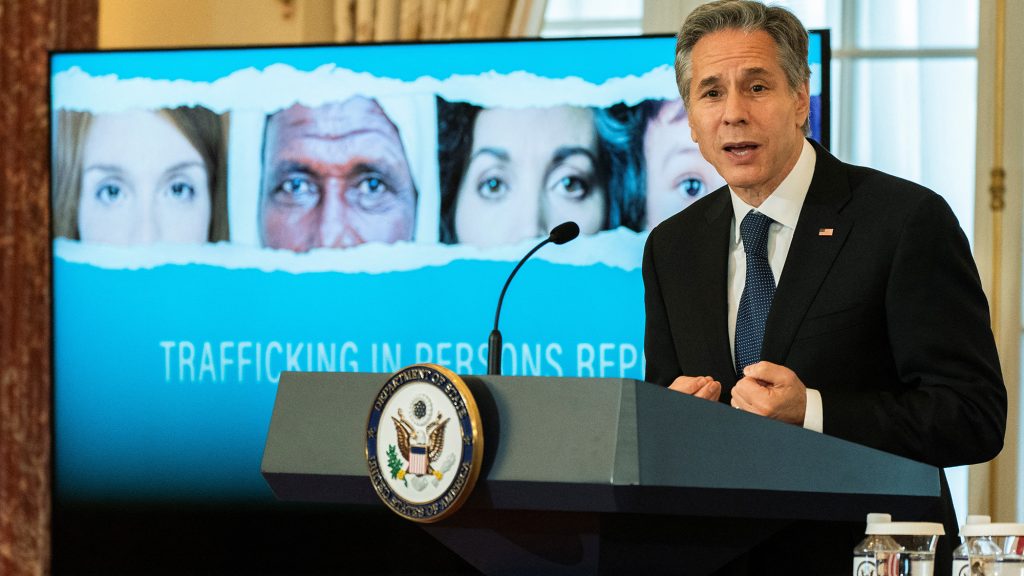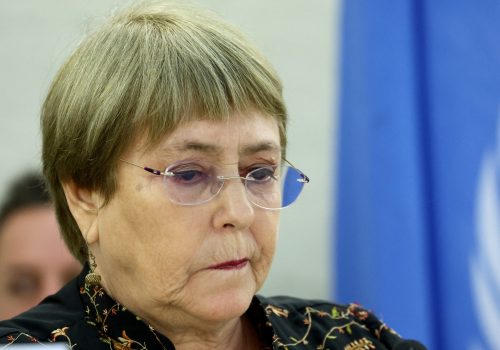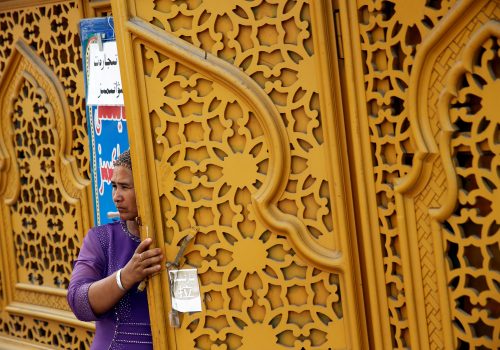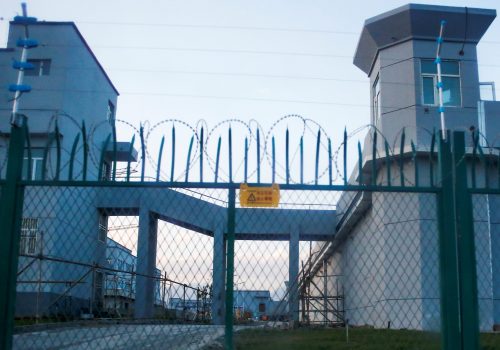Survivors of human trafficking lack the necessary assistance from governments, while offenders continue to operate with impunity. Victim identification is down—but bans on the import of goods made by victims of forced labor are on the rise. Survivor leadership matters, and more countries than ever are listening to victims.
These are just some of the facts revealed in the US State Department’s 2022 Trafficking in Persons (TIP) Report, released Tuesday, the gold standard when it comes to actionable information on human trafficking. It provides an account of 188 countries’ efforts to hold perpetrators accountable, provide survivors services, and prevent trafficking.
As the former US ambassador dedicated to combating human trafficking, I led and served a team that wrote multiple TIP reports. This one reveals a mix of progress and setbacks. Far too often, governments prioritize human trafficking with their rhetoric but not their resources. This must change.
Here are seven key takeaways from the report and what they mean for the fight against this economically motivated crime that strikes at the heart of human dignity.
1. Declining global prosecutions
In the battle between traffickers and governments, traffickers are winning. Around the world, authorities aren’t making progress; they are losing ground. Since 2015, according to the TIP Report, governments have reported a 45 percent drop in global prosecutions. Although governments’ responses to COVID-19 exacerbated this decline, the entrenched pattern existed before the pandemic. Even in the United States, the number of convicted traffickers has fallen from 526 in 2018 to only 203 over the past year. Although prosecutions alone are not sufficient to stop trafficking, they are a necessary and essential component of an effective public justice response.
2. Falling rates of victim identification
According to the TIP Report, governments around the world collectively identified 90,354 human-trafficking victims—a 24 percent decrease from the high-water mark of 2018. Using the International Labor Organization’s internationally accepted estimate that there are a total of 24.9 million victims globally, that means governments identified less than half of one percent of all victims. Governments must do much more to identify, protect, and serve the 99.6 percent who remain under the control of traffickers. This calls for far more than slight or modest increases in government efforts and resources.
3. Meaningful survivor engagement
The State Department noted that the number of survivor advisory councils, and the involvement of survivors in policy and funding discussions, increased from seven to thirty-four countries over the past year. One prominent example is Albania’s Advisory Board for Victims of Trafficking. Composed of survivors, it advises residential shelters on identifying victims, protection services, and best practices. Survivors are experts in their traffickers’ unique use of coercion as well as the trauma they experienced during their exploitation. Their increasingly prominent roles in leadership, employment, decision-making, and policy development is an encouraging trend.
4. Ranking highlights
The TIP Report ranks each country from Tier 1 (the highest) to Tier 3 (the lowest), and countries with a Tier 3 ranking are barred from receiving certain types of foreign assistance. This year’s report contains several notable rankings.
Germany was upgraded to Tier 1, after three years on Tier 2, based in part on increased prosecutions and convictions of traffickers and the opening of several new shelters, including shelters to serve male victims. These positive actions overcame the fact that 66 percent of convicted traffickers received suspended sentences, further perpetuating the sense of impunity traffickers enjoy.
Ireland used its human trafficking law for the first time in nine years and obtained two convictions. It also addressed the persistent problem of governments prosecuting victims for the unlawful acts their traffickers force them to commit. Ireland expunged more than six hundred criminal convictions for commercial sex offenses that will allow survivors to move forward without the burden of a criminal record. These positive factors lifted Ireland from the Tier 2 Watch List to Tier 2.
South Korea dove off the elite Tier 1 for the first time since 2001 (the first year of the TIP Report). In addition to fewer investigations and prosecutions, South Korea did not identify any victims in its migrant workers programs despite numerous credible reports. It also let the majority of convicted traffickers off the proverbial hook by sentencing them to less than a year in jail or mere fines. The TIP Report also highlighted the fact that South Korea did not take steps to stop prosecuting trafficking victims for criminal activity directed by their traffickers.
Other notable upgrades included Iceland, Belize, Romania, Thailand, and Uganda. Meanwhile, seven new countries joined fifteen others on Tier 3 (Belarus, Brunei, Cambodia, Curacao, Macau, St. Maarten, and Vietnam).
5. Too few forced labor cases
Across US administrations, there has been consistent concern about the lack of forced-labor cases in the United States, which amount to just seven prosecutions this year. This suggests that authorities are not cracking down enough. Increasing forced-labor prosecutions has been the TIP Report’s number-one recommendation to the United States for the last seven years, and remained so this year. But globally, there’s some good news: Governments reported prosecuting the largest number of cases (1,379) since data was first collected in 2008. Although a relatively small increase, it represents progress.
During the reporting cycle, the United States increased its overall number of human-trafficking prosecutions and victims identified; but it also decreased the number of labor-trafficking prosecutions—dropping from fifteen cases in 2021. There are specific ways to significantly increase forced-labor cases, including establishing and resourcing specialized investigative units and providing greater services for survivors.
6. State-sanctioned forced labor
When most people think about human trafficking, they imagine individuals, groups, and companies engaging in the crime. But governments can also be traffickers—a particularly troubling development, since the criminal-justice system is not available to provide relief when the government itself is the perpetrator. Think China’s exploitation of its Uyghur minority, North Korea’s systemic mistreatment of foreign laborers, and Cuba’s forcing of medical professionals to work in its lucrative foreign medical missions. In total, the 2022 TIP Report concludes that the same eleven countries have a government “policy or pattern” of human trafficking as the 2021 TIP Report did. The question for policymakers is how to use a combination of diplomatic carrots and sticks to get these countries to stop forcing people to work.
7. Stopping forced labor in supply chains
The TIP Report highlights the United States’ serious and sustained efforts to stop goods made by forced-labor victims from entering its ports, competing with market-based products, and leaving consumers as tacit enablers of nefarious companies’ human-trafficking schemes. For example, last year’s Uyghur Forced Labor Prevention Act made revolutionary strides in shifting the burden from governments to businesses to prove the absence of forced labor in imported goods. Moving beyond mere transparency requirements, businesses are now shouldering an additional burden to map their supply chains, identify the presence of forced labor, and rectify the problem. Both in government procurement and through private-sector sourcing, economic purchasing power is pressing down through supply chains to root out forced labor.
What is clear from this year’s TIP Report is a sense of urgency that more must be done to combat all forms of human trafficking. In the United States, Congress can begin by swiftly reauthorizing the Trafficking Victims Protection Act and confirming the next ambassador-at-large to monitor and combat trafficking in persons. They can also scale funding for specialized investigative units, victim services, and measurable prevention efforts. This is a cause which unites people across the political spectrum. Our intellectual commitment to freedom from sex trafficking and forced labor must result in practical actions and measurable results.
John Cotton Richmond is a nonresident senior fellow in the Atlantic Council’s Scowcroft Strategy Initiative and served as the US ambassador-at-large to monitor and combat trafficking in persons from 2018 to 2021, and currently is a partner at Dentons where he focuses on forced labor in supply chains and sex trafficking in workforces.
Further reading
Sat, Jun 18, 2022
Why I expected more from the UN human-rights chief
New Atlanticist By Rayhan Asat
Michelle Bachelet was supposed to fight for imprisoned Uyghurs like my brother. But she failed.
Tue, Dec 21, 2021
The US can lead the way to ending China’s modern slavery. My brother is counting on it.
New Atlanticist By Rayhan Asat
Moral arguments have been unable to sway global firms—so it’s time for the full force of the US government to step in.
Fri, Jul 23, 2021
A strategic framework for countering China’s human-rights violations in Xinjiang
Issue Brief By Jeffrey Cimmino
China is engaged in a systematic campaign of repression against predominantly Muslim ethnic minorities in Xinjiang Uyghur Autonomous Region (XUAR) in northwest China, and its actions call for a coordinated response on the part of the United States and its allies.
Image: US Secretary of State Antony Blinken speaks during the 2022 Trafficking in Persons (TIP) Report launch ceremony at the State Department in Washington, DC, on July 19, 2022. Photo via Manuel Balce Ceneta/Pool via REUTERS.



